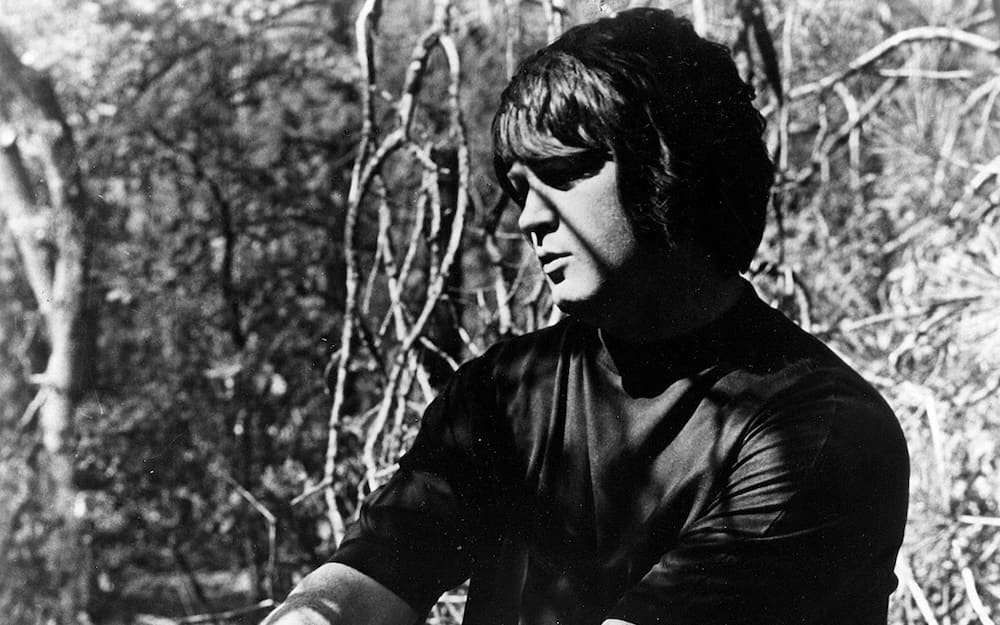The sheer glut of music today has rendered a question like “What’s your favorite song?” close to meaningless, but I have a definitive answer. The Beach Boys’ “In My Room” occupies pride of place in my sonic world. No, I’m not qualifying it as my favorite pop song. It’s my favorite song, full stop, edging out towering compositions like Coltrane’s A Love Supreme and Bach’s St. Matthew Passion. I’m not saying it should be on Voyager’s Golden Record. I’m simply saying that it’s shaped my inner world. I’m far from alone, of course. The late Brian Wilson had that impact on countless others.
To say Brian Wilson wasn’t your typical rockstar is an understatement. He didn’t have the Pre-Raphaelite locks of a Robert Plant or the sinister dynamism of a Jim Morrison. Heck, he didn’t even have the wholesome appeal of a Richard Carpenter. What he had was a thick mop of dark hair, a pudgy face, and dreaming eyes that would take on a scared rabbit look as the years wore on. A composer who happened to turn out glorious pop tunes, he was happiest giving shape to the wonderful stuff that filled that big head of his.
Whether we’re talking about the undeniably silly “Be True to Your School” or the mind-expanding trip that is “Good Vibrations,” these songs all soar like stray helium balloons. But there are shades of melancholy to be heard, even before an album like Pet Sounds showed us just how capacious this songwriter was. It’s there in the intro to “California Girls” when the swelling brass hovers like a thick cloud over the sunny beach. You can hear it in the wistful notes of “Girl Don’t Tell Me.” And of course, it’s there in “In My Room.”
Wilson is doing what great sages and visionaries down through the ages have always done, namely, unveiling the wonders of this world that remain hidden to most of us mortals.
A common refrain is that Wilson’s music transports us to a place of endless beaches, golden sunshine, iridescent oceans, and cresting waves. It’s true so far as it goes, but could just as easily apply to Jimmy Buffett’s music. It seems more true to say that Wilson is doing what great sages and visionaries down through the ages have always done, namely, unveiling the wonders of this world that remain hidden to most of us mortals. “Good Vibrations” isn’t an invitation to waste away on a cruise sheep with a margarita in your hand; it’s an invitation to open your eyes—to go to the “blossom world” that’s everywhere, hidden in plain sight. And the song truly is a wonder. Subject it to analysis and the results are dizzying. But Wilson is no scientist in a laboratory and you don’t need a phalanx of music theorists to appreciate the song.
When did I first encounter the Beach Boys? Though the ubiquity of their music virtually guarantees that I heard them sooner, my first firm memory involves Disney’s sci-fi classic, 1986’s Flight of the Navigator. I promptly filed them away as “lame” and “old” before growing (more like mutating) into a know-it-all-adolescent with an ideological commitment to all things metal. C. S. Lewis once said, “A young man who wishes to remain a sound atheist cannot be too careful of his reading.” Likewise, a doctrinaire metalhead cannot be too careful of his listening.
I’m not sure why I snatched a CD with a generic image of a surfer riding a wave from my parent’s catalog. It was one of those countless “Greatest Hits” compilations being churned out in those days. I plopped it into my Discman for a good hate-listen. Nothing like a snob’s perverse glee in condemning something that doesn’t conform to their rigid standards.
I paused for a few seconds on “Little Deuce Coupe,” feeling totally vindicated. (I still hate that song.) Then I came to “In My Room.” I played it again. And again. The song is sad, lush, and graceful, and it perfectly captured the shaggy, shapeless days of summer when I would lie on my bed, listening to music and dreaming. Wilson’s song may be about an escape from a domineering father and the massive expectations being placed on him, but it’s also clearly about the far-off realms of introspection and childhood reverie.
“There’s a world where I can go and tell my secrets to/In my room”
For me, the music conjures a twilight scene of dying sunlight falling across an unmade bed. My friends are bustling about in the world, pedaling bikes, kicking balls, and plunging into lakes. Most of them have unwittingly imbibed from the adults in their lives the poisonous notion that busy-ness itself is a virtue. And here I am listening to music and doing nothing more than being pensive. I can already feel an encroaching sense of guilt. I should be soaking up experiences, or at the very least, pulling weeds. I should be productive.
A kind of adult counterpart to “In My Room” is the song “Wind Chimes” from the troubled Smile sessions, which would never make it to a finished Beach Boys project. You can hear a more polished version on Wilson’s solo album of that same name, but the real magic is in the unfinished Beach Boys version. Beginning with the sneaky tip-toe sounds of a marimba, the song is about a grown man sitting at his home, crying and listening to the wind chimes that hang suspended from his window: “It’s so peaceful, close to a lullaby.” I especially love the mischievous bassline at the end, executed with crisp perfection by the inimitable Carol Kaye. The boy from “In My Room” has grown up and is now doing much the same thing, this time in his own home.
How did a delicate song about sitting alone in one’s room dethrone Slayer’s “Raining Blood” and Cannibal Corpse’s “Hammer Smashed Face”? Put simply, color, depth, and fragility. Wilson’s music is wildly colorful, bursting with exuberant life, and it effectively exposed most of my own listening as one-dimensional and monochrome.
“Raining Blood” is a throttling surge of raw energy. It socks you in the face, leaves you reeling, and then it’s done. Not unlike house music, its function is to propel motion. It’s all about action: pumping iron, pedaling a bike, pulling weeds. In sharp contrast, “In My Room” has the kind of depth that makes the song inhabitable. You can sink into its sonic recesses, lay back, and think.
“Hammer Smashed Face” wallops you with blastbeats and barfing vocals. But its outrageous violence has more in common with Tom & Jerry than any of the actual horrors that transpire in our homes and communities. The fragility on display in Wilson’s song, on the other hand, is true of human experience and is part of what makes it so confoundingly beautiful and painful. If we want to actually make sense of this strange symphony of life, we need to sit quietly in our rooms.
These days Slayer still accompanies my workouts—action music. But Wilson is there for that most important of spiritual habits, the times when I’m sitting quietly, doing nothing, and allowing my thoughts to wander.








